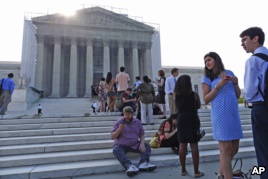VOA慢速英语:US Supreme Court Avoids Ruling on Affirmative Action Case
By VOA
03 July, 2013
From VOA Learning English, this is the Education Report.
Reaction appears mixed to a recent United States Supreme Court decision on affirmative action in university admissions. Affirmative action in admissions means that schools give special consideration to some racial or ethnic minorities. The goal is to create a more diverse campus, and to give more opportunities to groups that are under-represented in higher education.
The Supreme Court ruled that race can be one of many factors considered when a student applies to a college or university. The court said education benefits from having diverse student populations.
 |
| People line up in front of the Supreme Court in Washington, Jun. 24, 2013, before it opened for its last scheduled session. |
Some legal experts expressed surprise at the decision. They thought the justices would strike down a 2003 Supreme Court ruling. That ruling let universities use race in admissions decisions, but also said race needs to be just one factor among others.
In the new decision, the justices did not deal with the question of affirmative action itself, as many observers had expected. The court did not decide whether the idea violates the right of equal protection under the law, as guaranteed by the constitution. Instead, the justices sent the case back to a lower court for further consideration.
A white woman who had been denied admission to the University of Texas at Austin brought the legal case. Abigail Fisher argued that it was wrong to reject her, when minority students with similar grades and test scores were accepted because of affirmative action.
Wade Henderson is president of the Leadership Conference on Civil and Human Rights. He said the new decision reconfirms that it is an America's interest to increase opportunities for everyone.
Justice Clarence Thomas, the only African-American on the Supreme Court, voted with the majority but wrote a separate opinion. His opinion strongly attacked affirmative action in college admissions as violating the constitution. He also said that the diversity by itself does not have any educational benefit.
Ada Meloy is general counsel for the non-profit American Council on Education.
"...that the colleges and universities should have the right to decide upon who will be admitted to the institution. And those that feel they need to consider race or ethnicity and make that decision should be able to do so, in line with the law that has been proclaimed by the Supreme Court since the 1970's."
She said it was not clear how many of the 4,000 or so higher learning institutions in the United States use those criteria in deciding which student to accept. Ms. Meloy said many of the schools do not generally give special consideration to their applicants' race or ethnicity.
And that's the Education Report from VOA Learning English. I'm Karen Leggett.
[page]参考译文[/page]
From VOA Learning English, this is the Education Report.
这里是美国之音慢速英语教育报道。
Reaction appears mixed to a recent United States Supreme Court decision on affirmative action in university admissions. Affirmative action in admissions means that schools give special consideration to some racial or ethnic minorities. The goal is to create a more diverse campus, and to give more opportunities to groups that are under-represented in higher education.
美国公众对最高法院最近就高校招生平权法案的裁决反应不一。招生平权法案是指学校特别考虑一些少数族裔,其目标是为了创造一个多样化的校园,并给予在高等教育中代表性不够的群体更多的机会。
The Supreme Court ruled that race can be one of many factors considered when a student applies to a college or university. The court said education benefits from having diverse student populations.
美国最高法院裁定,学生在申请院校时,族裔可以作为众多考虑因素之一。法院表示,美国教育从学生多样化中受益。
Some legal experts expressed surprise at the decision. They thought the justices would strike down a 2003 Supreme Court ruling. That ruling let universities use race in admissions decisions, but also said race needs to be just one factor among others.
一些法律专家对该裁决表示惊讶。他们曾认为法官可能会推翻2003年最高法院的一起裁决。该裁决允许大学在招生决策中用族裔作为参考,但也表示族裔只能作为参考因素之一。
In the new decision, the justices did not deal with the question of affirmative action itself, as many observers had expected. The court did not decide whether the idea violates the right of equal protection under the law, as guaranteed by the constitution. Instead, the justices sent the case back to a lower court for further consideration.
在这起新裁决中,法官并未像众多观察人士预期那样处理平权法案自身的问题。法院并未裁决它是否违反根据宪法人人平等的权利。与之相反,法官将案件发回下级法院进一步审理。
A white woman who had been denied admission to the University of Texas at Austin brought the legal case. Abigail Fisher argued that it was wrong to reject her, when minority students with similar grades and test scores were accepted because of affirmative action.
被德克萨斯大学奥斯汀分校拒绝录取的白人女子阿比盖尔·费舍尔(Abigail Fisher)发起了这一法律案件。她认为当成绩差不多的少数族裔学生因为平权法案被录取时,拒绝录取她是不对的。
Wade Henderson is president of the Leadership Conference on Civil and Human Rights. He said the new decision reconfirms that it is an America's interest to increase opportunities for everyone.
韦德·亨德森(Wade Henderson)是民权和人权领导会议主席。他说,这起新裁决再次确认,增加每个人的机会符合美国利益。
Justice Clarence Thomas, the only African-American on the Supreme Court, voted with the majority but wrote a separate opinion. His opinion strongly attacked affirmative action in college admissions as violating the constitution. He also said that the diversity by itself does not have any educational benefit.
法官拉伦斯·托马斯(Clarence Thomas)是最高法院唯一的非洲裔美国人。他投票时遵从了多数人的意见,但写出了他的不同观点。他的观点强烈抨击高校招生平权法案违反了美国宪法。他还表示,多样性本身对教育没有任何好处。
Ada Meloy is general counsel for the non-profit American Council on Education.
阿达·梅洛伊(Ada Meloy)是非营利性的美国教育委员会的总法律顾问。
"...that the colleges and universities should have the right to decide upon who will be admitted to the institution. And those that feel they need to consider race or ethnicity and make that decision should be able to do so, in line with the law that has been proclaimed by the Supreme Court since the 1970s."
她说,“各高校应该有权决定录取谁。有些高校认为应该考虑族裔并如此决定,他们应该可以这样做,这符合19世纪70年代以来最高法院公布的法律。”
She said it was not clear how many of the 4,000 or so higher learning institutions in the United States use those criteria in deciding which student to accept. Ms. Meloy said many of the schools do not generally give special consideration to their applicants' race or ethnicity.
她表示,尚不确定美国4000所左右的高等院校有多少在使用这些标准来决定录取那些学生。梅洛伊女士表示,许多学校一般不会特别考虑申请人的族裔。
- 频道推荐
- |
- 全站推荐
- 推荐下载
- 网站推荐




















